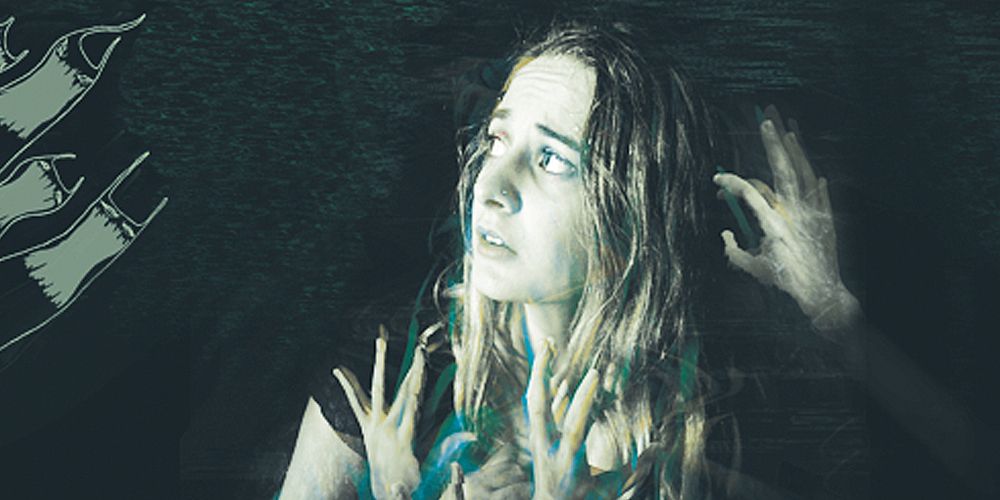Review: Invaders From Mars
Shannon Friday joins Long Cloud Youth Theatre for Invaders From Mars, a deep dive into the origins of fear at BATS Theatre.
I take one of the frowning scientist’s bright raffle tickets and head into the BATS Dome hoping to find a good seat, but the seats – my refuge, my comfort – are covered in danger tape. Instead, I mill about with my fellow audience members like travellers in an airport lounge, making chit-chat until the lights dim and an EDM version of Carl Orff’s “O Fortuna” blares over the speakers. The scientists, pulled straight from the 1950s with their floral dresses and big glasses, scurry among us with masks on, scaring us with dollar store ghosts on sticks. Then it all drops, and a voice over the loudspeaker tells us that “Experiment Number One” is complete; we can now take our seats and take refuge.
Invaders from Mars, the latest from Long Cloud Youth Company, is a devised show about fear and the politics of fear. There’s no real plot to speak of. Instead, the cast – Rosie Glover, Isadora Lao, Thomas Robinson, Libby Greatnews, Michael McAdam, and Jonathan Hobman – play scientists charged with conducting a series of experiments on us. Each scientist is defined by a single emotion – Angry, Sad, Brave, Heroic, Dull– and little else. They throw a whole bunch of different experiments at us to demonstrate and discover how fear-inducing stimuli influence thinking and behaviour. There’s dancing viral parasites! Lectures about the neuroscience of fear! Telegraphed-from-last-Tuesday jump scares! An audience participation-heavy quiz show about phobias called Quizophobia!
The longest experiment, and backbone of the show, is the attempt to recreate the 1953 film Invaders from Mars shot for shot. Where so much theatre seems dedicated to invisibly recreating the realism of film, the scientists make a game of it, scrambling to get set, props, and actors into place around Jason Longstaff’s precise lighting cues. The actors respond as vigorously as their temperaments allow – Angry Scientist seems forever on the verge of saying, “Are you kidding me?!?!” – and reveal the film for what it is: a campy sci-fi thriller that covers Red Scare fears of the Communist Other with aliens. As the plot escalates from the farmhouse to the Joint Chiefs and eventually the President, we’re freed to explore our own emotional responses to the film’s content and to horror-movie tropes generally. Safe in our future, we can laugh at and minimise the scares and scaremongering on display.
Invaders from Mars – the show – bluntly rejects the politics of fear, both past and present, and the more it digs into questions like “Who started us all thinking this, anyway?” and “Who benefits from this fear?”, the more I lean in. When they run with that investigation, their bluntness is surprisingly confrontational, and it keeps these questions tripping through my mind. I’m initially skeptical of a conversation late in the show between two men about a female co-worker; it seems ludicrous and overplayed. Then the conversation is repeated, word for word, between two women talking about their male co-worker. The repetition makes me sympathetic in the moment then haunts me after the fact; like the recreated scenes from Invaders From Mars reveal the scripts of the mid-century Red Scare, the scene lays all our scripts around sexual harassment bare, cutting uncomfortably, fascinatingly close. It leaves me wondering about what my reactions say about my gender politics, about how I have absorbed and internalized stereotypes of women as victims and men as aggressors even though I know logically that it's bullshit.
That’s the downside to Invaders From Mars: each experiment either makes me think or it doesn’t. There’s not much connective tissue linking experiments and the show really hangs together because of the cast’s infectious energy.
It’s wonderful when the show challenges me this way, and the more familiar and relevant the issue, the more I want it to do that. I want to know the question behind the experiment and participate in the investigation, and I’m not picky about which order those things come in. When I’m allowed to consider the social implications, I’m a pretty eager test subject. The more the devisers gesture at hot-topic fears and try to explain those fears, though, whether it’s bigotry towards refugees or fear of the upcoming US election, the more hollow this experiment feels.
In the middle of a scientific lecture on fear and biology, for example, the Dull Scientist (Lao) drops a bombshell about the meaning of our brightly-coloured raffle tickets: those of us with a certain colour ticket have been infected with a deadly parasite, but she's not saying who. I am so ready to play along, comparing my ticket with the people next to me, looking for similarities and differences, already engaging with the intrigue, if not treating the seriousness of the infection. Then the experiment ends abruptly, without exploration and without any instruction to further the life-and-death stakes for the infected and uninfected populations. I can rationalize this through connections to things like the Zika or Ebola outbreaks but I’m unclear what about these scenarios is being tested, what my role is in that testing, and what the results are and whether they’re significant or not.
That’s the downside to Invaders From Mars: each experiment either makes me think or it doesn’t. There’s not much connective tissue linking experiments and the show really hangs together because of the cast’s infectious energy. It feels less like we’ve been presented with a single idea and more like we’ve been audience to and participants in a theatrical debate, some bits more prepared and articulate than others. This would be less of an issue if the cast didn’t work really, really hard to tie everything up in a big final monologue, giving us our very own take-home message. There’s much richer stuff in inviting us to respond to the experiments personally and extrapolate our own data from the results.
I am so hungry for a show that does what Invaders From Mars tries to do. I love the rejection of story and realism and character and conflict in favour of experimentation and social commentary and active self-reflection. This show is still fighting to figure out the how to reject the former for the latter, and it doesn’t always make its points effectively because of that. Invaders from Mars is a damn fine show when it gives us time to think about how our fears are shaped by social and cultural scripts, but when it rushes things, or when it doesn’t dig deep enough, its experiments lose their urgency.
Invaders From Mars runs at
BATS Theatre, Wellington
from Thursday 27 October to Saturday 5 November
For tickets to and more information about Invaders From Mars, go here.

